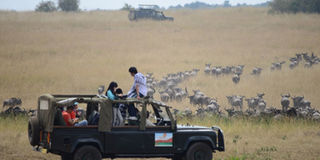Tanzania loses Serengeti road case

PHOTO | FILE Tourists watch wildebeest enter Kenya from the Serengeti National Park at a crossing point on Mara River.
What you need to know:
- Construction would have affected annual wildebeest migration between two countries
- The First Instance Division of the East African Court of Justice (EACJ) ruled last Friday that the planned tarmac road from Loliondo-Kleins Gate/Tabora B to Mugumu/Natta would interrupt the ecosystem.
ARUSHA
Tanzania has lost its case on the proposed highway across the Serengeti National Park that was lodged by a Nairobi-based animal welfare organisation.
The First Instance Division of the East African Court of Justice (EACJ) ruled last Friday that the planned tarmac road from Loliondo-Kleins Gate/Tabora B to Mugumu/Natta would interrupt the ecosystem.
Reading the judgment, Deputy Principal Judge Isaac Lenaola said that given the ecological concerns, the plan by the Tanzania government to construct the bitumen standard road across the park was unlawful.
The action would also infringe the East African Community (EAC) Treaty under which member countries have to respect protocols on the conservation, protection and management of natural resources.
The court, therefore, restrained the government from going ahead with the project because it has the potential to inflict irreparable damage to the environment.
“We have ruled on that subject based on the evidence before us and no more,” Judge Lenaola said, noting that although the road may be a popular decision by policy makers, once it is damaged, the environment can never be repaired.
The case was filed in December 2010 by the African Network for Animal Welfare (ANAW), a charitable pan-African animal welfare and community-centred organisation registered in Kenya.
In its submission, ANAW said the proposed highway would have “deleterious environmental and ecological effects” on the delicate Serengeti ecosystem and the adjoining protected areas such as the Maasai-Mara game reserve in Kenya.
The Serengeti/Maasai-Mara ecosystem is famous the world over for the spectacular wildebeest migration that draws thousands of tourists and nature lovers annually.
By going ahead with the “super-highway”, the applicant said, Tanzania would also be failing in its obligations contained in various international conventions and treaties on nature and biodiversity conservation.
Experts with M/S EarthCare Services Limited of Nairobi did a study last year and recommended an alternative route be created to avoid the negative impact on the environment.
Tanzania has repeatedly defended the road, saying a 53-kilometre stretch through the park would not be tarmacked like the rest of the planned “super highway” from Mto-wa-Mbu to Loliondo all the way to Mugumu/Natta in Mara region.
Findings by a consultant hired by the Tanzania government said the road would not harm the ecosystem while officials insisted they intended to tighten rules and laws on environmental conservation should the project get underway.




